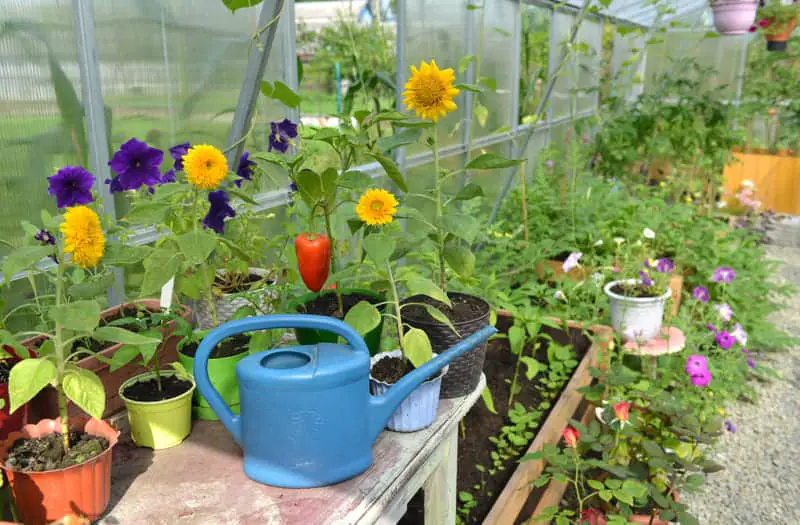Sunflowers are a wonderful addition to your garden with their bright, beautiful, and big flower heads. Now, the question is how often you should water sunflowers. Dive in and find out how you can give them the right amount of water to grow them to their maximum potential.
Sunny conditions and well-moist soil are two essentials for growing sunflowers. The ideal goal is to keep 6 inches of the topsoil moist. Sunflowers thrive in daily water routines.
Ensure that the soil has good drainage. Avoid letting the water sit for too long near the stem because the sunflower’s root and stem may rot. It also causes the plant to be unstable.
Sunflowers need to be watered regularly, about once every 3-5 days, depending on the weather and soil conditions. In hot and dry conditions, they may need to be watered more frequently.
To check if they need water, stick your finger into the soil around the plant’s base, if it feels dry 2-3 inches down, it’s time to water. It’s important to avoid over-watering sunflowers as this can lead to root rot. Additionally, make sure to water the soil, not the leaves, to prevent disease.
Did you know that sunflowers’ roots may grow up to 1.5 feet deep and around 1.5 feet in diameter wide below the garden surface? The Giant and Mammoth Sunflowers, these are the larger variety, can grow to a mighty 15 feet tall with proper care.
This is why it needs adequate water to sustain this growth rate. It is also why a well-developed root system is important if you’re growing them this big.
Another tip I would like to add is to use a sprinkler on your hose to water the sunflower head carefully. Keep in mind not to directly blast water on its face because that can damage the florets and wash away the pollens.
I’d pay attention to blasting the back of the leaves and the stem with water because pests love hiding behind sunflower leaves and on the stems.
How Often to Water Sunflowers in Pots
Sunflowers grown in pots, like the dwarf varieties, need a regular watering routine because potted soil loses moisture easily. It is best to water them early in the morning before the sun hits them.
Use your index finger to see if the top two inches of the soil are dry. This is always a good practice to have before watering sunflowers. A good rule of thumb for gardening to remember or, is it the rule of the index finger?
When the top 2 inches of the soil is dry, water your sunflower plant deeply. Establish that the water runs out of the draining holes and your sunflower’s roots are not sitting on waterlogged soil when you irrigate.
Deep, well-draining soil is the key to make sure that you do not overwater your sunflower plant.
How Often to Water Sunflower Seeds
- It would be best if you kept your sunflower seeds moist for them to germinate within 7-10 days.
- You may choose to cover the sunflower seeds planted in moist soil with plastic wrap.
- Once the seeds germinate, you can remove the plastic wrap and continuously water them about an inch from the topsoil as they grow.
- Once the sunflower seedling has 4 leaves and its true leaf sprouts, you must transfer them to their growing site so that their root system will fully develop.
Do you still have more questions on how to keep your sunflowers healthy? I’ve collated some of the Frequently Asked Questions on how you can easily achieve this.
Can Sunflowers Get too much Rain?
Sunflowers grown in garden beds love bouts of rain. It saves you from supplemental watering if your sunflowers get rainwater about 3 times within the week. Sunflowers can tolerate rainy days, but they are not rainproof.
Torrential rains may damage the sunflower head or may snap the stem from the heavy downpour. It is best to place a cover over your sunflower garden (if this is possible) when the weather forecasts a deluge.
One of my best practices that I’d like to share is to check the weather app before watering your sunflower plants, so they don’t get overwatered if it happens to rain. If it doesn’t, then no need to worry.
Your plant will survive a day of underwatering. You can always water later towards the end of the day. Overwatered plants are more difficult to revive. We’ll talk about how we can revive overwatered sunflowers below.
Can Sunflowers Grow in Winter?
Sunflowers can survive cold temperatures as low as 25 F with minimal damage. However, colder temperatures will kill the whole stalk. Snow makes the flower heads droopy and mushy.It is advisable to start sowing the seeds after the last frost has passed when the temperature of the soil is between 55-60 F.
The best time to do this is around the end of April to the beginning of May, depending on the last frost date.
Ensure that the soil is properly prep before planting sunflower seeds. Make sure that the soil is fertilized 8-inch deep.
Another alternative is to sow the seeds in peat pots and keep them indoors two weeks before the last anticipated spring frost if the growing season is short.
Are you excited to grow your own sunflowers this summer? Here are other Frequently Asked Questions that sunflower growers ask related to the sunflowers’ water requirements.
Can you overwater sunflowers?
Proper conditioning of the soil before you sow the seeds is the key for your sunflowers not to get overwatered. Keep in mind that the pot or garden bed has good drainage. Sunflowers love well-draining sandy loam soil.
They don’t like waterlogged clay soil because this stunts their growth and, in worst cases, causes the sunflower to die due to root rot. Once you nail the proper soil preparation, overwatering your sunflowers should be the least of your worries.
Just in the case sunflowers were overwatered, save them by skipping watering for a few days and aerating the soil.
How do you know when sunflowers need water?
Fully grown sunflowers are drought tolerant to an extent, and you can let the soil dry between watering. They may look dehydrated and half-dead, with all the leaves looking wilted and thirsty after a hot summer day.
You can revive them by giving them sufficient dousing of water. However, please don’t wait for the plant to completely dry out because they risk losing their petals when this happens.
Why are my sunflower leaves turning yellow?
- When the sunflower leaves turn yellow, the roots tell you that they are sitting in waterlogged soil.
- You may skip watering for a few days until the top two inches of the soil dries out. You can also cultivate the soil and aerate it to give the roots the space to breathe.
- Proper sunflower care is fairly easy to achieve. They add beautiful and vibrant colors to your garden.
- The key to growing your sunflowers to their full potential is your soil’s right preparation and conditioning before sowing the seeds.
- This guarantees that you don’t have to worry about overwatering your sunflowers, whether you grow them in garden beds or pots.


